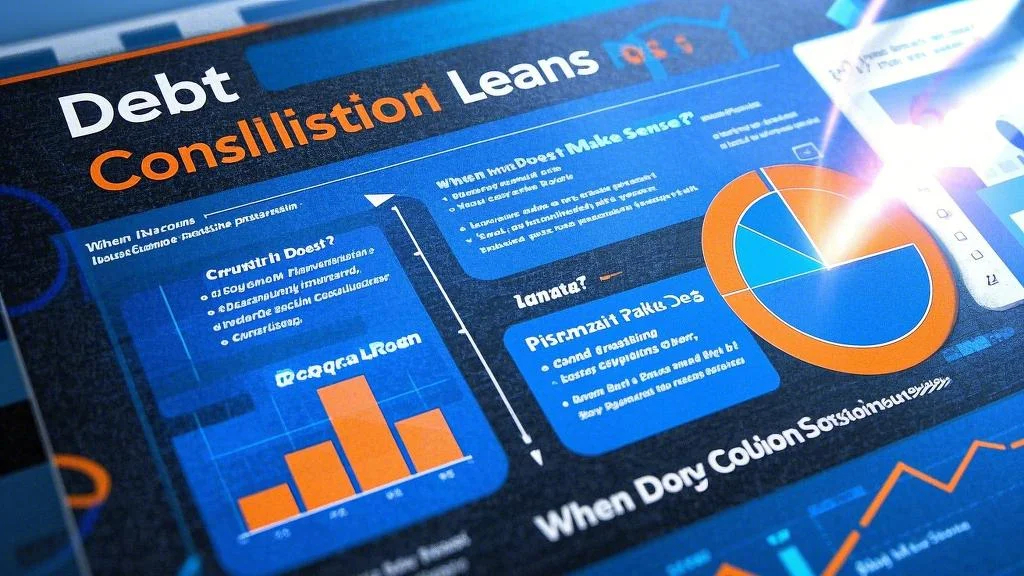Debt Consolidation Loans: When Does It Make Sense?

Understanding Debt Consolidation Loans
Debt can feel overwhelming, especially when you’re juggling multiple payments with high interest rates. Debt consolidation loans offer a potential solution by combining your debts into a single loan with a lower interest rate. This simplifies your finances by reducing multiple payments to one, making it easier to manage your debt and potentially saving you money on interest over time. However, debt consolidation isn’t a one-size-fits-all solution. It’s important to understand when it makes sense to pursue this option and how it fits into your overall financial strategy. For example, if you have high-interest credit card debt, a debt consolidation loan with a lower personal loan rate could significantly reduce your monthly payments and help you pay off your debt faster.
One of the key benefits of debt consolidation loans is their ability to provide financial clarity. Instead of keeping track of multiple due dates and interest rates, you’ll have a single monthly payment to focus on. This can reduce stress and help you stay organized as you work toward becoming debt-free. Additionally, debt consolidation loans often come with fixed interest rates and repayment terms, providing predictability and stability. However, it’s important to carefully evaluate your financial situation before pursuing this option. For instance, if you’re struggling with a low credit score, working with a best credit repair service or seeking credit counseling services might be a better first step to improve your financial health.
When Debt Consolidation Loans Make Sense
Debt consolidation loans can be a smart financial move in certain situations. If you’re dealing with multiple high-interest debts, such as credit card balances or personal loans, consolidating them into a single loan with a lower interest rate can save you money and simplify your payments. This is especially true if you can secure a loan with a competitive personal loan rate. Additionally, if you’re struggling to keep track of multiple payments or frequently miss due dates, a debt consolidation loan can help you stay organized and avoid late fees.
Another scenario where debt consolidation makes sense is when you’re looking to improve your credit score. By consolidating your debt, you can reduce your credit utilization ratio, which is a key factor in your credit score. Additionally, making consistent, on-time payments toward your consolidation loan can help build a positive credit history. However, it’s important to avoid taking on new debt while paying off your consolidation loan, as this can undermine your progress. If you’re unsure whether debt consolidation is right for you, consider consulting with a credit counseling service to explore your options and develop a personalized plan.

Comparing Personal Loan Rates for Debt Consolidation
When considering debt consolidation loans, it’s essential to compare personal loan rates to ensure you’re getting the best deal. Personal loan rates can vary widely depending on your credit score, income, and the lender you choose. Generally, borrowers with higher credit scores qualify for lower interest rates, which can significantly reduce the overall cost of your loan. To find the best rate, shop around and compare offers from multiple lenders, including banks, credit unions, and online lenders.
One of the key advantages of securing a low personal loan rate is the potential to save money on interest over the life of the loan. For example, if you’re consolidating high-interest credit card debt, a lower interest rate can help you pay off your debt more quickly and reduce your monthly payments. Additionally, some lenders offer flexible repayment terms, allowing you to choose a loan term that fits your budget. However, it’s important to read the fine print and understand any fees associated with the loan, such as origination fees or prepayment penalties. By carefully comparing personal loan rates and terms, you can find a debt consolidation loan that meets your needs and helps you achieve financial freedom.
Mortgage Refinance as a Debt Consolidation Strategy
For homeowners, a mortgage refinance can be an effective way to consolidate debt. By refinancing your mortgage, you can take advantage of lower interest rates and use the equity in your home to pay off high-interest debts, such as credit cards or personal loans. This strategy can simplify your payments and potentially save you thousands of dollars in interest over time. However, it’s important to carefully consider the costs and risks associated with refinancing, such as closing costs and the potential for a longer loan term.
One of the key benefits of using a mortgage refinance for debt consolidation is the ability to secure a lower interest rate. Mortgage rates are typically much lower than credit card or personal loan rates, making this an attractive option for homeowners with significant debt. Additionally, refinancing can provide access to cash for other financial goals, such as home improvements or emergency savings. However, it’s important to avoid using this strategy as a quick fix without addressing the underlying causes of your debt. Working with a credit counseling service can help you develop a long-term plan to manage your finances and avoid falling back into debt.
Credit Counseling Services: A Valuable Resource
For individuals considering debt consolidation loans, credit counseling services can provide valuable guidance and support. These services offer personalized advice on managing debt, improving your credit score, and developing a budget. A credit counselor can help you evaluate your financial situation, explore your options, and determine whether debt consolidation is the right choice for you. Additionally, many credit counseling services offer debt management plans, which can help you pay off your debt more efficiently while avoiding the need for a loan.
One of the key benefits of credit counseling services is their ability to provide a holistic approach to financial health. In addition to helping you manage your debt, a credit counselor can offer advice on saving, investing, and planning for the future. This can help you build a strong financial foundation and avoid future debt problems. Additionally, credit counseling services often work with creditors to negotiate lower interest rates or waived fees, making it easier to pay off your debt. By working with a reputable credit counseling service, you can take control of your finances and achieve long-term financial stability.